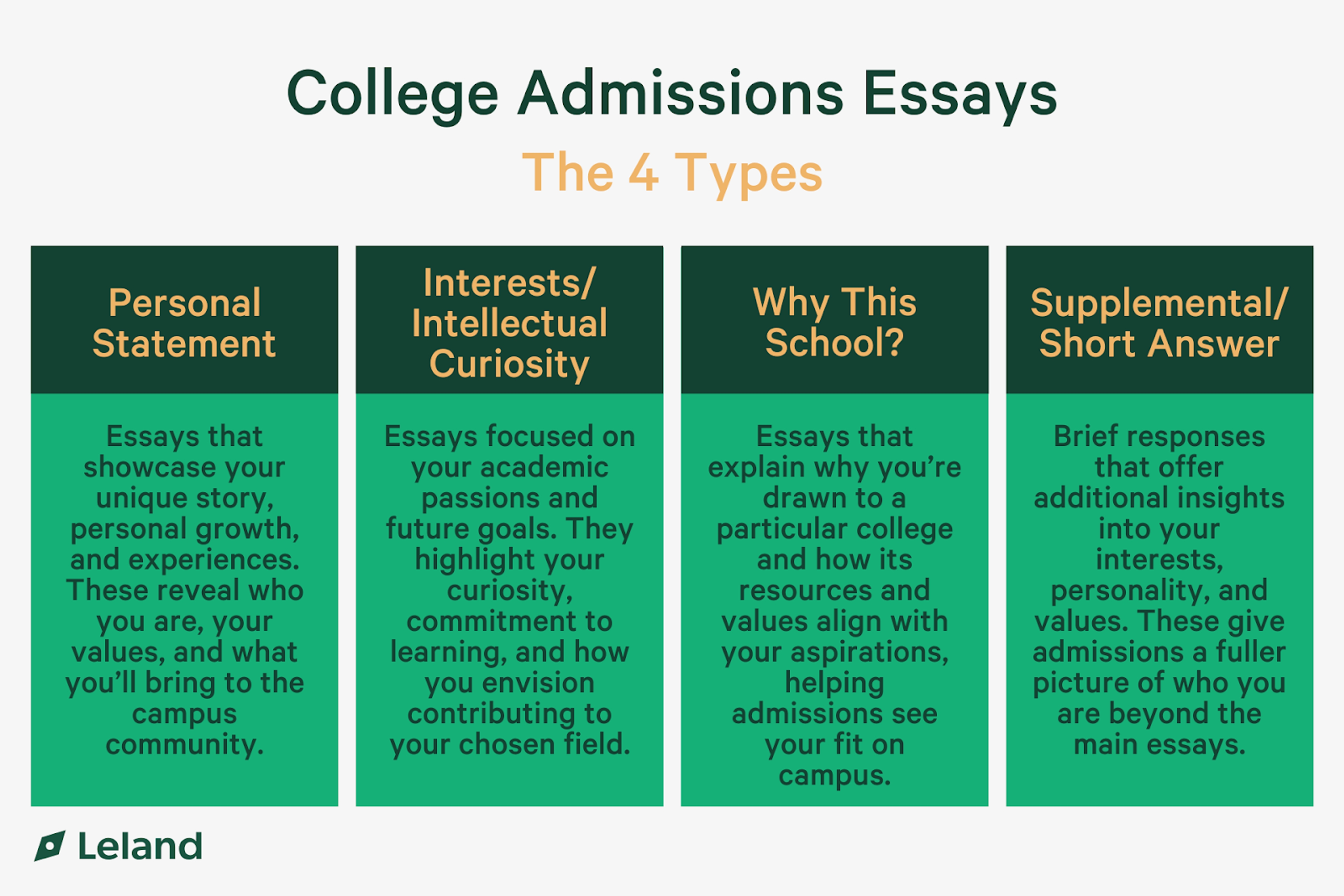How to End a College Essay (With Examples)
Learn how to end your college essay with impact—straight from a trained admissions expert. Discover the key dos and don'ts, plus actionable tips to make your writing stand out to admissions committees.

By Kanishka E.
Harvard Ph.D. | College Admissions Coach | Strategy and Storytelling
Posted June 27, 2025

Table of Contents
A college essay is a personal statement that is submitted as part of the application required to gain admission to a university. Colleges use essays to evaluate a student's abilities, achievements, and potential.
Most college application essays are written in response to a prompt or question posed by the Common App essay or the specific institution they’re applying to. The prompt may ask the student to describe a significant experience, discuss a personal interest or passion, or explain why they are interested in attending that specific university.
Why Your College Essay Matters
The purpose of a college essay is to give the admissions committee a sense of the student's personality, interests, and motivations. It’s also an opportunity for the student to share their unique perspective and demonstrate their writing skills and ability to think critically. It’s also an opportunity for the student to share their unique perspective and demonstrate their critical thinking and writing skills, although the latter is becoming less central in admissions decisions due to the increasing use of AI writing tools.
A well-written college application essay can be a powerful tool in helping a student stand out from the competition and improve their chances of being accepted to a top-tier college university.
As a college admissions consultant and former Teaching Fellow at Harvard, I’ve spent years helping students craft compelling personal essays that reflect both their individuality and intellectual depth. I understand how to bring structure, heart, and authenticity to a story.
In this guide, I’ll share strategies to help you write a powerful, memorable conclusion to your college essay—one that leaves a lasting impression on admissions officers and ties your narrative together with clarity and purpose.
For a full guide on writing essays for college, read: How to Write an Amazing College Essay: 3 Tips for Success and Writing the College Essay: Dumplings, Dogs, the Letter S, and the 5-Step Process That Makes Sense of All the BS
College Essay Types and How to Approach Them
When tackling a college essay, understanding the different types can significantly influence how you present your narrative. Each type serves a distinct purpose and requires a tailored approach to ensure your application stands out.
1. Personal Statement Essays
A personal statement often asks you to reflect on your life experiences, values, personal growth, and aspirations. This is the common application essay. To approach this type effectively:
- Be as authentic (and specific!) as possible. Share genuine stories that highlight your personality and growth. Admissions officers want to know the real you, not what you think they want to hear. Remember, the AdCom reads thousands of essays from other students; you’ll stand out by finding your own story because you are the only you applying.
- Focus on a cohesive theme. Choose a central theme or message for your personal statement that ties your experiences together. What is the main point that you want the reader to walk away knowing? This will create a narrative that makes sense, comes full circle, and resonates with the AdCom.
- Show, don’t tell. Use vivid anecdotes to illustrate your points. Instead of stating you’re resilient, describe a situation where you demonstrated resilience. Stories are powerful because they act as proof that you are who you say you are (and will therefore accomplish what you say you’ll accomplish).
2. Supplemental Essays
This type of college essay often complements the personal statement and can focus on specific questions or prompts related to the college or your intended major. To excel:
- Heavily research the institution. Tailor your responses to reflect why you are a good fit for that particular school. Mention specific programs, values, or opportunities that excite you. Why is that school the absolute best school for you, and how will you make the most of your time there if accepted?
- Be direct. Address the prompt clearly and succinctly. Admissions officers appreciate straightforward answers that don’t meander. You’d be surprised how many applicants write an incredible essay… that doesn’t answer the question.
- Highlight what makes you stand out. Use these essays to showcase aspects of yourself that haven’t been covered in your personal statement, such as leadership roles, achievements, or unique interests. What makes you different from anyone else applying? What do you bring to the table?
3. Academic Interests and Intellectual Curiosity Essays
Some colleges encourage students to showcase their intellectual curiosity and passion for learning through creative or thought-provoking prompts. Here’s how to make the most of these opportunities:
- Engage the reader. Start with a captivating hook that draws the reader in*. This could be a provocative question, a vivid description, or a surprising statement. Again, remember how many essays the admissions officers read each year.
- Use imagery. Employ metaphors, imagery, and dialogue to enrich your storytelling. These elements can make your essay more memorable and enjoyable to read. With that being said, you should remain yourself. If your essay doesn’t sound like you when all is said and done, then it’s not as authentic as it should be.
- Maintain purpose – what is the main point you are trying to convey? Even in creative essays, ensure your narrative ties back to your main message or what you want the committee to learn about you.
Expert Tip: Use a strong hook in all your essays if possible. It is especially important in the personal statement, where capturing the reader’s attention early can make a big difference. In shorter, highly structured essays (such as a 150-word “Why us?”), Clarity and conciseness might matter more than a dramatic opening. However, even in these cases, a surprising, vivid, or personal opening can still elevate your response, so long as it feels natural and not forced.
4. “Why This College?” Essays
These essays are critical for demonstrating your interest and fit for a particular institution. To craft a compelling response:
- Be specific. Avoid generic statements; demonstrate that you’ve done your homework. If you could copy and paste anyone’s name onto your essay and it would make sense, it’s not specific enough. Discuss particular courses, faculty, clubs, or values of the institution that resonate with you. This last part is important. It’s not enough to research the school thoroughly. You also need to show why you are a great fit. Demonstrate how the school’s specific resources, opportunities, or are a strong match for your interests, needs, and goals.
- Connect your past to your present and future. Illustrate how the college’s offerings align with your academic and career ambitions, showcasing a clear connection between you and the institution. What is the full circle between where you have been and where you are going, and how does the school fit into that?
- Express enthusiasm. Your passion for that college should shine through. Let your excitement be infectious, leaving the admissions committee eager to bring you on board. Yield – or the percentage of students admitted to the school who end up attending – is an important metric for colleges. They want to know that the people they extend an offer to actually want to go to that institution.
Expert Tip: Try this exercise: Imagine you’re already a student at the college. What does a typical day look like? What classes are you taking? What communities are you part of? What moments make your experience meaningful? If you can clearly picture this and paint that vision for the admissions committee, it will go a long way in helping them see you as a natural fit for their campus.

How to Write a College Essay Conclusion
Now we arrive at the heart of this article: how to end a college essay effectively. While each part of the essay comes with its own nuances and challenges, many students find the conclusion to be the most difficult. It can be tricky to wrap up your essay in a way that feels both powerful and authentic, while also reinforcing the central message of your essay and leaving a lasting impression.
The conclusion is also important because it is the last thing that the admissions committee member who is reviewing your application will read. In other words, it’s your last opportunity to make a good impression and leave the reader with a clear and lasting conviction of your potential and your fit.
When writing a conclusion for a college application essay, there are a few key steps to follow. Note that good essays come in all shapes and sizes, and there is no set of concrete rules. These guidelines are designed to help you brainstorm a good one, but there are many successful essays that have chosen to go a more creative route.
Summarize your thesis.
It’s likely that your essay begins with some kind of thesis, or the main point or argument that you are trying to make in your essay, and then supports that thesis throughout the entire essay. Note that in college essays, this often looks more like a theme than the thesis you would have for an English paper.
For example, is your story that you are an underdog whose life has continuously been beaten down, but at each step, you persisted? Or maybe it’s that you had a family member who had health struggles, and you have made it your life mission to get an education that would allow you to help solve these medical mysteries. It doesn’t have to be that dramatic as long as your essay paints a clear picture of who you are and what's important to you using stories from your life.
The angle that you decide to take will be entirely dependent on your unique story and strengths; take time to figure out the overall story that you want to tell. What picture of yourself are you trying to paint? Introspection is one of the most powerful tools in a college applicant’s arsenal because it shows self-awareness and thoughtfulness. Take time to think through your background and aspirations, what you want out of college, what is unique about you, what you are motivated by and interested in, and more.
In your conclusion, restate this thesis, purpose, theme, or argument in a new and interesting way, so that the reader is reminded of what your essay was about and why it was important. This doesn’t mean that your personal statement ending should be a dry, “and because of this, I want to attend X school.” There are ways to do this creatively and powerfully.
Explain why your essay is important.
In your conclusion, you may also explain why your essay is important and why the reader should care about your message or argument. This can be done by connecting your thesis to a larger issue or problem, or by discussing the implications of your argument. For college essays, this usually means connecting the argument to your future. Why is your story relevant to who you will be and what you will do on your college campus, and beyond?
Expert Tip: Remember, when admissions committees are deciding whether to admit students, they’re basically betting on their future potential. It’s your job to demonstrate this potential in your essays. You can also think of this part as answering the “so what?” question.
End with a strong statement that provides a sense of resolution with a complete close-up.
Finally, end your conclusion with a strong statement that leaves a strong final impression on the reader. Generally, we recommend avoiding quotes unless it’s extremely relevant. It’s usually a lot more effective (and impressive) to use your own words.
You also want the essay’s conclusion to feel like a natural stopping point without wrapping up every detail too neatly. Admissions officers want to see a real, authentic voice rather than a perfectly packaged “conclusion.” Think of it as giving them a glimpse of your future journey, with a final note that leaves them both satisfied and intrigued.
When you’re getting ready to write your conclusion, think about each of these questions and write down a few bullet points for each to ensure your conclusion reflects what you actually want to say.
- What is my argument (in one sentence or a few words)?
- What impressions or feelings do I want the admissions committee member to walk away from this essay with?
- How do I want the reader to feel while reading this essay?
- What tone do I want to convey? Formal, informal, friendly, assertive, humorous, convincing, etc.?
What Not To Do When Writing a College Essay Conclusion
As you write your conclusion, here are a few things that we recommend you do not do.
- Use a cliche closing phrase: Usually, it’s better to develop your conclusion naturally without the inclusion of “in conclusion,” “in closing,” “in summary,” or a similar phrase.
- Introduce topics that you haven’t included earlier in the essay: Your conclusion is not about opening up the door to further topics. Rather, it’s about tying everything together and putting a bow on it, so to speak. Don’t introduce a new idea or try to stuff something in that should’ve been included in the body.
- Change the tone/argument style: This goes for anything to do with your writing style. For example, if your argument is primarily a logical one, don’t switch to an emotional one in the conclusion. If you employ a formal tone in the body of the essay, don’t switch to a casual tone in the end.
- Summarize the essay: The conclusion should not just repeat what you have already written. Not only is this a waste of the already-limited space, but it also makes for a dull and unconvincing read. Your conclusion should naturally follow from what you have written earlier in the essay without repeating any of it.
College Application Essay Tips
Writing a college essay can be daunting, but it is also a significant opportunity to share your perspective and experiences with the admissions committee. Now that we’ve covered the conclusion, here are a few general tips that will help you write a compelling essay body.
- Start early: Start the writing process for your essays as early as possible, so that you have plenty of time to revise and edit. This will also help you avoid feeling rushed or overwhelmed.
- Be yourself: Your essay is an opportunity to share your unique background and stories with the admissions committee. Be honest and genuine in your writing, and avoid trying to be someone you are not. Lean into what makes you different because that is what will help you stand out from the many other applicants.
- Follow the prompt: You may think this point is obvious, but it’s something many students struggle with. Make sure to carefully read and understand the essay prompt, and respond to it directly. Avoid going off on tangents or writing about unrelated topics. Because of the word limit, every part of the essay should be immediately relevant to the broader story you’re trying to tell.
- Proofread and read it out loud: Make sure to carefully proofread and edit your essay for grammar, spelling, and punctuation errors. It can also be helpful to have someone else read your essay and provide feedback. Once you have a solid draft, we also recommend reading your essay out loud. This will give you an idea of how the essay will sound to the adcom member.
Good College Essay Ending Examples
While your admissions essay and how you end it will be completely unique to your experience and the college you are applying to, here are a few example final paragraphs to show you what an admissions officer might be looking for in an ending to your essay. Feel free to use these as a guide, but take the time to write your own powerful conclusion that will stand out from other applicants.
Good Example 1
Theme: Finding vulnerability through art
Student’s Background: This student found a passion for art and used it as a means of coping with and expressing emotions following the loss of a close family member.
Losing my grandmother felt like losing a part of myself, but through art, I found a way to reconnect, not only with her memory but also with the emotions I had buried deep. My paintings became my sanctuary, a place to process grief, joy, and everything in between. But beyond a personal refuge, art has become a powerful language for me—a way to communicate ideas and feelings I never could through words alone.
Now, as I prepare for college, I am eager to explore how my creativity can extend beyond the canvas. I look forward to bringing my passion for art to the broader community, finding ways to advocate for mental health and healing through visual expression. With every brushstroke, I carry my grandmother’s memory forward, ready to create and connect in new, meaningful ways. I’m excited to see where this journey will take me and to share a piece of my heart with others along the way.
Good Example 2
Theme: Resilience through STEM
Student’s Background: This student struggled with self-doubt and failure in early science and math courses but eventually thrived, discovering a love for engineering.
There was a time when I thought I’d never understand physics, let alone thrive in a field as rigorous as engineering. I’ll never forget the weight of failure in my first high school physics class, or the sting of believing that I wasn’t “smart enough.” But through persistence and the help of a mentor, I learned to view each challenge as a puzzle to solve rather than a mountain to climb. That shift transformed my approach to learning and, ultimately, to life itself.
Today, my love for problem-solving fuels my passion for engineering. I no longer fear challenges—I seek them. I am ready to step onto campus not only as a student eager to learn but as someone prepared to take on hard problems with determination and resilience. Engineering has taught me that success isn’t about innate talent; it’s about grit, curiosity, and the belief that every failure brings us closer to a solution. As I continue my journey, I look forward to building a future where I can use these skills to create a meaningful impact.
Good Example 3
Theme: Equity in education
Student’s Background: This student grew up in a low-income community with limited access to resources, eventually founding a tutoring program to support younger students.
Growing up, I saw classmates fall through the cracks simply because they didn’t have the support they needed to thrive. Realizing how education inequality shapes lives and futures lit a fire in me that I couldn’t ignore. Founding a tutoring program for younger students in my community showed me that even small actions can make a profound difference. Watching students grow and succeed reminded me that potential is universal, but opportunity is not.
Now, as I prepare for college, my mission to fight for educational equity has only grown stronger. I am determined to study policy and advocacy to make sure every student has access to the resources they deserve. My experiences have taught me that no challenge is too big if you care enough to take it on. I’m ready to bring that conviction to college, and I hope to work with others who are equally committed to building a more just and equitable world. This isn’t just a goal—it’s my life’s work, and I can’t wait to get started.
Bad College Essay Ending Examples
Bad Example 1
Common Mistake: Clichéd and generic
In the end, I believe that my hard work and determination will lead me to success in college and beyond. I am excited to meet new people, learn more about myself, and see where life takes me. College is the next chapter in my life, and I am ready to embrace it.
Why It’s Bad: This conclusion lacks specificity and depth. Phrases like “I am excited to meet new people” and “College is the next chapter” are vague and overused, offering little insight into the student’s character or motivations. The reader learns nothing unique about the applicant, and there’s no clear connection between their personal experiences and their future goals. Admissions officers read thousands of essays with similar sentiments; a strong essay should avoid clichés and generic statements in favor of more authentic, specific reflections.
Bad Example 2
Common Mistake: Repetitive and unnecessary summarization
To summarize, I have learned that hard work, resilience, and staying focused are the keys to success. From my experiences on the soccer team to my role as student council president, I have shown my commitment to excellence and personal growth. These lessons will guide me as I move forward into college.
Why It’s Bad: This conclusion simply repeats information from earlier in the essay without adding anything new. It reads more like an unnecessary summary than a thoughtful closing, and it fails to bring a fresh perspective or insight. Rather than rehashing previous points, a conclusion should ideally provide closure, offer a final thought, or add an element of introspection. Admissions officers want a sense of who the applicant has become, not just a list of activities they’ve done.
Bad Example 3
Common Mistake: Overly formal and detached
Thus, I have concluded that I am an ideal candidate for your prestigious institution. With my skills, knowledge, and experience, I am well-prepared to thrive in the academic rigor and social environment of your esteemed college. I look forward to contributing to the school’s excellence.
Why It’s Bad: This conclusion feels impersonal, overly formal, and robotic. The language (“Thus, I have concluded…”) is stiff and gives the impression of a cover letter rather than a personal statement. There’s no warmth, personality, or genuine enthusiasm in the writing, making it hard for the reader to feel a connection to the applicant. Additionally, the tone is self-promotional without offering specific reasons why the student genuinely values this opportunity or how they’re a unique fit for the school. Admissions committees appreciate sincerity over forced formality.
The Bottom Line
Your college essay conclusion isn’t just a place to wrap things up—it’s your last chance to leave a meaningful impression. Whether you’re highlighting personal growth, connecting your story to future goals, or simply leaving the reader with a lasting sense of who you are, the ending should feel purposeful and true to your voice. Don’t overthink it, but don’t overlook it either. The strongest conclusions are the ones that make the admissions reader pause for a moment and say, “I want to meet this student.” So take a breath, revisit your core message, and trust yourself to bring your story to a thoughtful, powerful close. You’ve got this.
As you put together your college applications, here are a few other resources you may find helpful:
- How to Pick the Best College for You
- Top Questions to Ask a College Admissions Officer
- 4 Tips to Elevate Your College Essay
- What Really Matters When Preparing for College
- How to Build the Best Extracurriculars for College
- What Looks Good on College Applications? 6 Tips to Make Your Application Stand Out
- Top Free Resources for the SAT/ACT
Kanishka E. is an experienced college admissions consultant and Harvard Ph.D. with a unique academic background spanning business, economics, and anthropology. Over the past decade, he’s taught and mentored students, helping them develop compelling personal narratives that stand out in highly competitive admissions processes.
Known for blending structured thinking with deep human insight, Kanishka brings a storyteller’s touch to every essay he works on. Whether you’re applying to a top-tier university or navigating the Common App, he’ll help you craft an essay that’s both powerful and personal. Book a free intro call with Kanishka and take the next step toward submitting a standout college application essay!
FAQs for Writing College Essay Conclusions
How do you write the last sentence of a college essay?
- The final sentence of your college essay should leave the reader with a clear and lasting impression. This could be a powerful reflection, a resonant image, or a subtle insight that ties your story together. A forward-looking ending — one that points to who you're becoming or what lies ahead — often works especially well, as it connects your past to your future and shows your potential fit for college.
How to write the last paragraph of a college essay?
- The final paragraph is your last chance to make a final positive impression on the admissions officer reading your essay. Summarize your points and find a way to bring them all together for a strong, memorable finish.
How do I close out a personal essay?
- To close out a personal essay effectively, revisit your core theme or message and reinforce it in a fresh, reflective way. Your conclusion should provide a sense of resolution while leaving the reader with a lasting impression of who you are. Avoid simply summarizing what you’ve already said—instead, offer a final insight, a forward-looking statement, or a personal reflection that ties your story together. Most importantly, stay true to your voice and avoid clichés—your authenticity is what will resonate most with admissions committees.

Written by Kanishka
5.0
(25)
Academic & Professional Background • Interdisciplinary Thinker – My academic journey took me from a Bachelor’s in Business to a Master’s in Economics, and finally to a Ph.D. in Anthropology from Harvard, giving me a rare mix of structured problem-solving skills and deep human insight. • A Decade at Harvard – I spent nearly a decade living on Harvard’s campus as a Ph.D. student, Teaching Fellow, Resident Advisor, and Wellness Fellow, gaining a deep understanding of elite institutions and high-performance environments. • A Multi-Faceted Career – My professional path has spanned energy research, entrepreneurship, academia, and coaching, allowing me to support clients in navigating career transitions, personal growth, and high-stakes decision-making. • Full-Time Coach – I have transitioned into coaching full-time because helping people achieve breakthroughs and reach their goals is my life’s work. I currently divide my time between admissions consulting, life coaching, and researching everything that can help me get the best results for my clients. • Certified Life Coach – I am a Human Potential Coach (previously known as the Bulletproof Coach, founded by Dave Asprey) but draw from a wide range of methodologies to tailor my approach to each client. • Certified Yoga Teacher & Breathwork Instructor – I have taught in India, Thailand, and at Harvard’s Graduate School, where I also served as a Wellness Fellow, integrating physical and mental well-being into student life. • Experienced Writer & Communicator – o I’ve published 50+ articles in business magazines, written in-depth industry reports, and completed a Ph.D. dissertation praised for its clarity and originality. o Stand-Up Comedy & Storytelling – I perform stand-up comedy, conduct comedy and writing workshops, and use humor and storytelling to make ideas resonate. o Public Speaking – I have delivered talks to audiences of 2,500+ people, helping break down complex ideas into engaging, relatable insights. What I Bring to Coaching • A Natural Storyteller – We are all storytellers. The stories we tell ourselves and others deeply influence our success and overall well-being. My background in ethnography, research, stand-up comedy, and live storytelling has sharpened my ability to help people craft compelling personal narratives—whether in college applications, or life decisions. • Big-Picture Thinking with Personal Insight – I have a wide range of intellectual interests, from economics, business, and politics to technology, AI, sci-fi, and storytelling, and I love making sense of complex ideas in a way that is structured, human-centered, and actionable. • Cross-Cultural Perspective – Having lived and worked in India, the U.S., and Thailand, I understand the nuances of different education systems, industries, and cultural landscapes—helping clients from all over the world navigate them effectively. What Drives Me • An Unconventional Path to Academia – I wasn’t always a high achiever. In fact, I was a below-average student until 10th grade—which gives me a deep appreciation for non-linear learning journeys, late bloomers, and untapped potential. • The Power of High-Quality Guidance – I grew up in an environment with little support, went to a boarding school from age 5 - 17, and spent the summers with a hands-off, single father. I struggled—with bullying, health challenges, and feeling like I wasn’t living up to my potential. • Why This Matters – The few times I did receive empowering guidance, it changed everything. That experience shaped how I approach coaching today: I don’t tell people what to do—I help them see new possibilities and uncover their strengths in ways they often don’t expect. • Blending Analytical & Creative Thinking – My work combines the analytical precision of business and economics with the narrative depth of anthropology and storytelling, making complex ideas more engaging and accessible. When I'm Not Coaching... • A Love for Nature & Movement – I practice yoga, breathwork, and meditation daily, balancing intellectual pursuits with physical and mental well-being. • Living in a Tropical Paradise – In 2023, I moved to a small, forest-covered island in Thailand, where I hike, explore waterfalls, and enjoy the outdoors—all with excellent WiFi. • An Insatiable Curiosity – I read 100+ books a year, and I’m beginning to think I might have a problem! • Holistic Approach to Growth – As a certified life coach, yoga teacher, and breathwork instructor, I integrate mindset, resilience, and well-being into both academic and personal development coaching.
Kanishka has helped clients get into organizations like:
London School of Economics and Political Science, University of London
Columbia University
Harvard University
Columbia Business School
INSEAD












